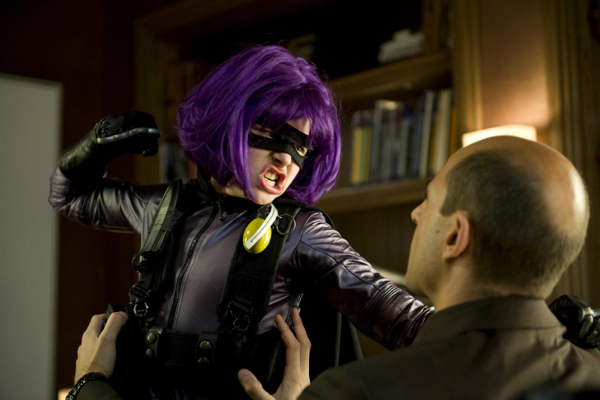Movie review by Greg Carlson
The latest movie to draw some fire for depicting envelope-pushing levels of carnage, mayhem, violence, and profanity – much of it courtesy of pre-teen character Hit-Girl – “Kick-Ass” should see plenty of ink on opinion pages in the days to come. Based on the comic series written by Mark Millar and illustrated by John Romita, Jr., “Kick-Ass” is a wannabe satire never quite bright enough to present a cogent argument explaining the premise that there are consequences for actions taken by “real” people who choose to behave like superheroes. Director Matthew Vaughn wallows in the explosions and curses well past the point at which “Kick-Ass” morphs into the very thing it was purportedly trying to skewer.
High school nobody Dave Lizewski (Aaron Johnson) orders a green and yellow wetsuit and takes to the streets as the masked vigilante of the title. Following a period of recuperation after a disastrous encounter with two toughs who batter and stab him, Dave is caught on video attempting to assist a victim of street violence. The uploaded footage goes viral, and Kick-Ass sets up a MySpace page to handle the tidal wave of interest in his exploits. If Vaughn intended to say something about the use of social media in the service of post-Bat-Signal identity construction, the message gets lost as soon as Big Daddy (Nicolas Cage) and Hit-Girl (Chloe Moretz) enter the frame and start slaughtering baddies.
Narratively speaking, the colorful father-daughter team emasculates Kick-Ass, and Vaughn struggles to make room for the genre’s de rigueur expositional back-stories/origin myths as well as cram in a parade of tedious scenes setting up a villainous crime boss (Mark Strong), whose son (Christopher Mintz-Plasse) becomes Red Mist, yet another costumed hero added to the mix. The closer we get to the end of the movie, the more Vaughn amplifies the shocks. The filmmaker shamelessly imitates pop culture gleaner extraordinaire Quentin Tarantino, scoring off-speed, blade and pistol gymnastic showdowns to Ennio Morricone.
Vaughn also carries over and amplifies some of the comic’s worst impulses, including a casual homophobia played broadly for laughs. The movie does not use the other “F” word as abundantly as Millar’s series, but when Dave pretends to be gay in order to get close to his crush, the stereotypes pile up quickly, and Vaughn makes certain to telegraph relief when our protagonist is allowed to “prove” he is straight. It’s a departure from the comic, in which Dave gets a knuckle sandwich instead of the girl.
Only Nicolas Cage maneuvers the script with a sense of timing commensurate with the kind of winking irreverence that should have been the target of all the actors. His mentally unstable, revenge-driven gun nut is significantly more sympathetic than Millar’s original humorless brainwasher, whose rightist rhetoric while training Hit-Girl is absent from the screen adaptation. Cage is only upstaged by Moretz’s Hit-Girl by way of her sewer-mouth artistry, status as a juvenile, and way with a blade. The movie belongs to her and that is also its liability, since the title is “Kick-Ass” and not “Hit-Girl.”
